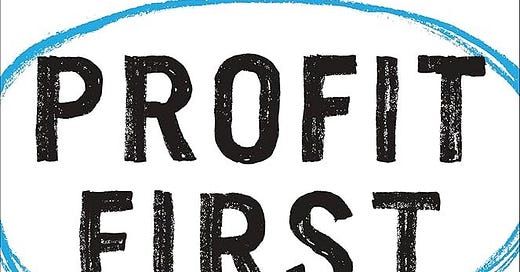Key: Rob’s comments are in italics, Derek’s comments are in normal font.
We're talking today about a book that personally has really helped me on my business journey. It's a fast book to read and that book is Profit First. Why are we covering ‘Profit First’ and what do people need to know about it?
Right, because this is the best summary that I've found of an actual concrete proposal for methods of doing your accounts, which makes it really simple, particularly anybody who's in a one-man business situation or anything close to that. Ordinarily, traditionally in business, you need a chief financial officer, somebody who is the internal accountant for the business and that person has got the responsibility for summarizing the total financial situation at any time that you need to run the business.
If you're in a startup situation or ongoingly as a more or less sole operator, you probably don't have the luxury of being in a position to employ somebody solely to do that, particularly as they tend to command quite high rates of pay. On the other hand, spending too much time on those kind of issues is a distraction from your core operation to run the business as best you can.
If you're an entrepreneur or a specialist in some area which you probably are if you're running your own business, you quite likely don't have the temperament to get terribly excited about doing a lot of number crunching and spreadsheets and so forth.
That's not why people start their business in the first place, is it?
It is not, no. Many years ago, I had a company that I'd created, wound up by a high court writ from the VAT man because we hadn't paid the VAT. My accountant's comment was only the VAT man would be stupid enough to waste more money by winding up a company that obviously has no assets.
The point is I got into that situation precisely for the reason that I just spoke. If you are registered for VAT either because it's strategically beneficial or because you have to because you've exceeded the £85,000 or whatever it is currently threshold, then this can bite you fairly badly if you don't allow for the fact that a certain amount of your revenue is the VAT that you've collected on their part and you will have to pay typically every quarter.
Regardless of that, if you're running any business that is other than very minor, you are going to have to put in a tax return at the end of each tax year and you are going to have to settle the payments. It's just as well that you don't lose sight of at least approximately how much you're going to need to do that. Now the core method.
Just on that, I remember one January very distinctly having to find what was approximately three times my average monthly earnings within about a four week period. Then also pay my accountants to do my end of year return. That was not a fun January. I wouldn't wish that on anyone.
Typically the way that businesses have operated is that they've had one business account, all the revenues go into their payment. The payments are made from that account and then this is the role of the Chief Financial Officer to actually produce some sort of report saying of the money that's in that account, what headings it's allocated to.
The principle, the core of the methodology that Mikhailovich describes in this book is that you have several bank accounts and then twice a month, he suggests doing this on the 11th and the 25th of each month, you sit down and you allocate the money from the revenue account to the various other bank accounts.
His suggestions are that there should be certain percentages depending on the size of your business. For example, if your real revenue is in the range of zero to £250,000, which I think for typical small business that would be where you start. There would be one account for what he calls profit which should be 5%, one for the owners compensation which should be 50% and one for tax which he suggests should be 15% and one for operating expenses that should be 30%. The 30 plus 15 plus 50 plus five adds up to the hundred.
When your business is running smoothly, all of your income coming into the business from your invoices and sales goes into the revenue account. Then when you do your twice monthly allocation, you transfer that into the other four accounts in the prescribed proportions.
If you're already running the business, when you set it up, you take the revenue account and then twice a month you distribute it between the other accounts. For example, the operating expenses account would cover all of your things like accounting fees, stationery supplies, office equipment, things like that and you would pay for those out of the operating expenses account.
In addition, if you have a business that has a certain amount of either subcontractors or employees or materials needing to be bought, then you would need another account for those. Your actual income coming into the business, first of all, needs to go to account that deals with those matters and then what is left is what he calls real revenue.
That is revenue net of the immediate cost of delivering the services or the goods that you're in the business to do. It's that real revenue which is split up according to that figure. The reason he calls his book Profit First is that that profit account is one that you have to allocate something to because otherwise you haven't got a business.
You've simply got a job with yourself as boss. There must be a profit. Once a year you can look at the profit account. You might decide to declare a dividend and give it to yourself and use it to go on a holiday with or something like that or buy yourself some treats or you might decide to reinvest it in expanding the business.
Either way, you're clear that that is something separate from your compensation, the payment that you pay yourself as the owner for working in and on the business. Is that clear so far?
Makes sense to me.
If you're already in business, there's an exercise that you can perform to find out what is so right at this moment by running those numbers as though you were splitting them into those separate accounts. This in itself is a wake up call. You might find that you're not doing nearly as well as you thought you were.
Once you've done that exercise, then when you do each of your fortnightly allocations and you pay any bills that are needed to be paid, that in itself is a worthwhile discipline because it will build up your credibility and your reputation with any suppliers you've got. As you do that, you'll see what percentages you have managed to transfer into those accounts and you'll know whether you need to increase or decrease it.
That gives you immediate feedback for the tactical and strategic decisions that you need to run as a business.
Yeah, I found a lot of huge benefit from just having a tax accounts. That's the main account that I really do this with at the moment. I can definitely see as your business scales and grows and your business touches the lives of more people, this becomes critically important.
In years gone by, when it was entirely possible to get a real rate of return in the way of interest on a bank account, anything that you're not needing to call on for some period of time, you could put it in an interest earning account and get some benefit.
In the present economic climate, you could do worse than buying gold with it. There is a 10% spread between the buying and selling price typically of gold coins or other forms of bullion. There is a certain amount of volatility so it's not entirely devoid of risk but certainly you wouldn't have gone too far wrong by doing that over any time over the past 20 years.
I mean, gold is not an investment as such, but it is probably a more secure form of savings than most bank accounts. That's a different topic. I'm being slightly flippant there, but...
Yeah, but the points of your business is to take money off the table. If you got surplus, you could convert it into, into whatever. That could be gold. It could be something else.
Whatever kind of savings you think of. Okay. So that's an overall summary. Anybody who is in business, this book would be an excellent investment. I think I've given you enough of an overview to have a sense of where he's going with that. We could take it from there.
I think just as a comment, the thing I really liked about it was that the system he talks about in the book is applicable to a modern business, but it's actually the replication of a much older analog system. He talks about his mother and her being paid a fairly small amount of wages, but he said that she used to have different pots for different things, like a pot for groceries and a pot for car repair.
She just siphoned off money into different pots. He realized about 30 years later, it's like, that's the system she knew. It's not like he invented anything. There's an element of diligence about it as well as a diligent sort of practice from incorporating it into your monthly workflows.
Yeah. In these days, when we can have real time access over the Internet to the balances in our bank accounts, it means that simply by looking at the amount of money in those various accounts, you know exactly where you stand. Whereas if it's all in one account, as I say, you've got to do some sort of analysis process to arrive at that.
I think as well, people tend to underestimate how much they need to be earning gross. Whereas actually, you're splitting all of your money off every two weeks into different accounts, there's no way to hide basically. You can see whether you're doing enough or not. That in itself is a good thing.
Yeah, absolutely. There's no reason why you can't, as you indicated, why you shouldn't be doing this in your private life. Even if you're an employee, it could give you immediate clarity if whenever you get your salary check, you split it up between the different categories of what you have to do.
I think we've all got a tendency to be over optimistic.
That's the nature of the business owner. It's optimistic. There was a difference between how I operate my business on this and then how I operate my personal finances.
Every year in July, my current insurance bill goes out. I know it's gonna go out. I know that they're gonna try and put the renewal premium up. Every year at the end of May, I'm surprised at the fact of how fast it's coming up again, whereas it would be pretty easy to just siphon off £30 a month or whatever and put it to one side. It's the same idea.
I don't know about you, but the quotation I got for renewing the house insurance this year was pretty well double what it was last year. If that wasn't bad enough last year, it was pretty well double what it was the year before.
It had basically quadrupled in two years. I suspect insurance companies take the mickey in terms of knowing that inertia rules and most people are simply going to carry on renewing. In years gone by, you used to get some kind of concessionary rate for being a long term customer.
Now, in a lot of cases, it seems to be the reverse. They take advantage of the fact that most people are going to...
They just bleed you for as long as you stay in the same place.
Yeah, so I did get a better quote, but I'm wondering, apart from that opportunism, whether this is a better indication of the rate that inflation is going at the moment. It's not inconceivable that the insurance claims had doubled between this time last year and now and that they doubled between then and a year previous to that.
Not necessarily that there are going to have been more burglaries, although there may well have been, but simply that the costs on an annual basis of buying whatever was necessary to settle the claim had in fact gone up by 100% year on year. Certainly the notion that the official statistics tell us about the rates of inflation don't strike me as in accordance with my own experiences.
There's been plenty of groceries and things that have gone up 20% from one month to the next. Okay, anything else to say on this topic or will I do for now?
No, no, I think, I think we'll obviously just endorse the book and yeah, let's leave it there.
Thanks for listening this episode of Sovereign Finance. For more episodes, transcripts, in-depth articles, and the community, please take a minute now to subscribe free using the button above. You’ll receive a free email notification whenever we publish a new article or conversation.
















Share this post